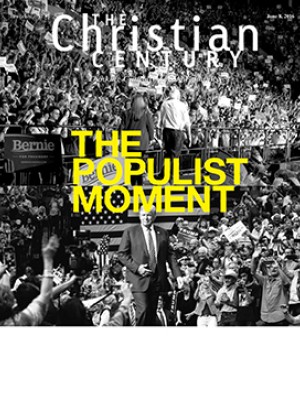Love in the time of evil

It’s 2016 and the problem of evil is still unsolved. In the YouTube universe, the problem has found its megaphone in the British actor, comedian, novelist, memoirist, and hero of the British Humanist Association, Stephen Fry, a witty, outspoken, charismatic public personality of the sort that inevitably gets called “larger than life.”
Philosophers tell us that there are two kinds of arguments from evil that justify atheism: logical and evidential. The logical argument maintains that, given evil, the existence of the God of classical theism is logically impossible. The evidential argument, less definitive but with a more devastating emotional punch, holds that the horrific kinds and quantities of evil make God’s existence at once improbable and morally indefensible.
Read our latest issue or browse back issues.
Stephen Fry’s specialty is the devastating emotional punch. In an appearance last year on Irish TV he responded to broadcaster Gay Byrne’s question—“Suppose it’s all true, and you walk up to the pearly gates and are confronted by God. What will Stephen Fry say to him, her, or it?”—with a tirade that captured 4 million views on YouTube. “I’d say, bone cancer in children? What’s that about? How dare you? . . . Why should I respect a capricious, mean-minded, stupid God who creates a world that is so full of injustice and pain? . . . Yes, the world is very splendid, but it also has in it insects whose whole life cycle is to burrow into the eyes of children and make them blind. They eat outwards from the eyes. Why?”
That the interview was recently shortlisted for the Sandford St. Martin award in religious broadcasting is a tribute to Fry’s rhetorical power rather than his originality. He is one in a long line of protesters against divine enormities, with forerunners in David Hume (“Is he willing to prevent evil, but not able? then is he impotent. Is he able, but not willing? then is he malevolent”), John Stuart Mill (“Nature impales men . . .”), and the psalmist (“My God, my God, why hast thou forsaken me?”).
One would have to be an insect oneself not to sympathize with Fry’s revolt against a world in which insects burrow through children’s eyes. But when I think of Fry lodging his protest at the pearly gates, I can’t help imagining an alternative scenario. Suppose that upon arrival Fry meets someone he respects—a writer he admires, such as E. F. Benson. Then the divine comedy might turn out differently, for Fry might be willing to travel through God’s country purely for the pleasure of Benson’s company.
Let’s suppose, then, that Benson and Fry travel to the sphere of the traditional theologians, where they spot three friends relaxing under a fig tree: a man in a bishop’s miter with an open book on his lap, a plump Dominican friar, and a ruddy-faced Oxford don. Perhaps you can guess who they are. The bishop has been saying that evil is a privation of good, not a thing God made. The friends agree: God could have stocked his cosmos with harmless robots, but it was a greater good to endow creatures with free will. That we would abuse the gift of our freedom is the risk God took in creating us. Satan had free will, too, and used it to mar creation out of spite. Perhaps the insects that feed upon the eyes of innocent children owe something to his ruinous art; yet God will ultimately bring good even out of this horrendous evil.
Fry is not convinced, however; abuse of free will can account for moral mischief up to a point—but why doesn’t God do more to contain the collateral damage?
The sound of a nightingale draws the travelers to a damp valley where a young poet sits by a plum tree; next to him is a progressive theologian with a dictionary of metaphors on his lap. Don’t call this world a “vale of tears,” says the poet, call it a “vale of soul-making.” Elaborating on the poet’s theme, the theologian offers his “soul-making theodicy”: evil enables us to recognize good; suffering is a school for training in courage and sacrificial love. The poetry is poignant, but the grass is slippery and the argument dissipates in the rising mist.
Ascending to the sphere of the contemplatives, the travelers detect a scent of roses. The three Teresas are here, and together they urge Fry to consider that within the darkness there is a hidden and transfiguring divine light. The Teresas make no attempt to detain the travelers with an argument but point beyond themselves to the Mystical Rose in the highest heaven.
Drawing closer to the Rose, Fry sees a sign that says, “Abandon hope all ye who enter here.” He turns on his guide: “Damn you, Benson, you’ve tricked me, you’re no better than the rest of your God-mongering family. This is the entrance to hell!” But then he notices a second sign: “Abandon faith all ye who enter here.” That’s more like it. So he enters—his feet feel lighter now—and finds a man with a crown and lyre chanting, “My God, my God, why hast thou forsaken me?” The song echoes from the cross; the angelic Sanctus blends in. Could this be God’s answer? If so, faith and hope are swamped by love, and the insoluble is dissolved.






